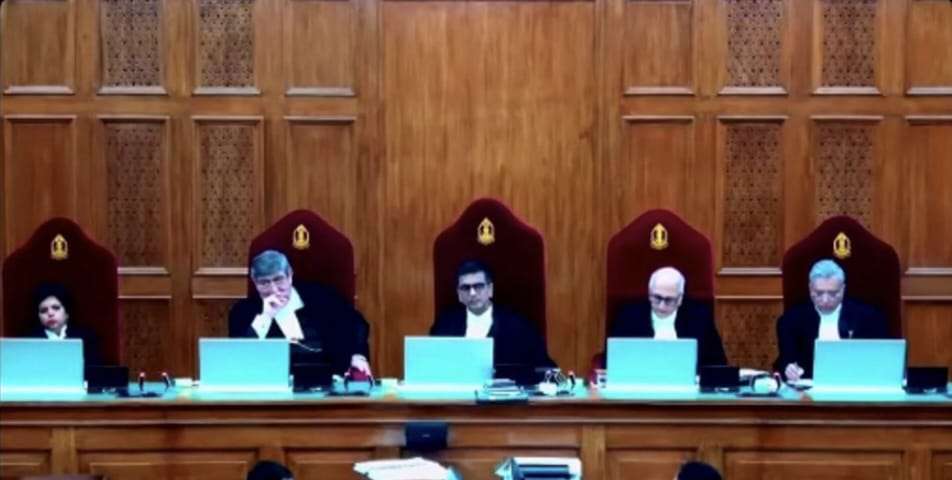New Delhi, Oct 17: Constitution Bench headed by CJI DY Chandrachud delivered judgement in the Same Sex Marriage case on Tuesday..
Supreme Court refused to give marriage equality rights to the LGBTQIA+ community in India.
There were four judgements in this case – by CJI DY Chandrachud, by Justice Sanjay Kishan Kaul, by Justice Ravindra Bhat, and by Justice PS Narasimha.
SC left the judgement on changing law on same-sex marriage up to Parliament.
Soon after the judgement was announced, there has been disappointment among the people of this community.
SC Top Quotes on Same-sex marriage judgement
- No legal recolonisation, rules Supreme Court by 3-2
- “There is no unqualified right to marriage except as it recognised under the law. Conferring legal status to civil union can only be through enacted law. Transsexual persons in homosexual relationships have the right to marry” says the Supreme Court on same-sex marriage
- “I recognise that there are multifarious interpretative difficulties in reading the SMA to include marriage between non-heterosexual relationships,” says Justice SK Kaul
- “SMA (Special Marriage Act) provides a secular framework for solemnization and registration of marriage. I respectfully disagree with my brother Justice Bhat that the sole intention of SMA was to enable marriage of heterosexual couples exclusively. To my mind, the stated objective of SMA was not to regulate marriages on the basis of sexual orientation,” says Justice SK Kaul in Supreme Court’s verdict on same-sex marriage.
- Queer persons have right to choose partners, State cannot be obligated to recognise rights flowing from such union: Justice Bhat
- Justice Bhat says he disagrees with the CJI DY Chandrachud on the right of queer couples to adopt a child and raises certain concerns on the matter.
- Justice Ravindra Bhat said, “The Court can’t put the State under any obligation when there is no constitutional right to marry or legal recognition of unions among non-heterosexual couples.”
- Justice Ravindra Bhat reading his judgement said, “There cannot be an unqualified right to marry which is to be treated as a fundamental right. While we agree that there is a right to a relationship, we squarely recognise that it falls within Article 21. It includes the right to choose a partner and enjoy physical intimacy with them including the right to privacy, autonomy etc. and should enjoy this right undisturbed from society and when threatened State has to protect the same. There cannot be any doubt that there is a choice to have a life partner.”
- “Contrary to what is stated in the judgment of Justice Bhat, the directions in my judgment do not require the State to create a social or legal status, or a social institution. The directions are with a view to recognising the choice that a person makes for themself when they choose another to be their partner for life. The directions seeks to make that choice a meaningful one; nowhere do they create an institution of any kind. Rather they give effect to the Fundamental Rights in Part 3 of the Constitution,” says CJI DY Chandrachud
- “The following directions are issued to the police machinery: 1. There shall be no harassment of queer couples by summoning them to the police station or visiting their places of residence, solely to interrogate them about their gender identity or sexual orientation. 2. They shall not force queer persons to return to their native families if they do not wish to return to them. 3. When a police complaint is filed by queer persons alleging that their family is restraining their freedom of movement, they shall on verifying the genuineness of the complaint and ensure that their freedom is not curtailed. 4. When a police complaint is filed apprehending violence from the family for the reason that the complainant is queer, or is in a queer relationship, they shall on verifying the genuineness of the complaint, ensure due protection. 5. Before registering an FIR against a queer couple, or one of the parties in a queer relationship, where the FIR is sought to be registered in relation to their relationship, they shall conduct a preliminary enquiry in terms of Lalita Kumari vs Government of UP to ensure that the complaint discloses a cognisable offence,” says CJI DY Chandrachud
- Legal recognition of non-heterosexual unions is step towards marriage equality, says Justice SK Kaul
- Non-heterosexual and heterosexual unions must be seen as both sides of same coin: Justice SK Kaul
- Justice S K Kaul agrees with CJI on grant of certain rights to queer couples
- Court records SG Tushar Mehta’s statement that Centre will form panel to decide rights, entitlements of persons in queer unions: CJI
- Queer is a natural phenomenon known for ages, it is neither urban nor elitist, says CJI Chandrachud
- CJI directs police to conduct preliminary enquiry before registering FIR against queer couple over their relationship
- States, UTs to ensure that inter-sex children are not allowed sex-change operation at age when they cannot fully comprehend consequence: CJI
- Centre, States and Union Territories to ensure queer community is not discriminated against, CJI Chandrachud
- CJI says material benefits/ services given to heterosexual couples & denied to queer couples will be a violation of their fundamental rights.
- This court has recognised that equality demands that queer persons are not discriminated against, says CJI Chandrachud
- All persons, including those queer, have right to judge moral quality of their lives: CJI Chandrachud
- Ability to choose life partner goes to root of right to life and liberty under Article 21, says CJI Chandrachud
- Whether there is need for change in regime of Special Marriage Act is for Parliament to decide: CJI Chandrachud
- It would be incorrect to state that marriage is a static and unchanging institution, says CJI Chandrachud
- To imagine queer as existing only in urban spaces would be like erasing them, queerness can be regardless of one’s caste or class: CJI
- This court can’t make law. It can only interpret it and give effect to it, says CJI Chandrachud
- CJI D Y Chandrachud says there are four separate judgements in the matter
- SC commences pronouncement of verdict on 21 petitions seeking legal validation for same-sex marriage
WATCH
Find latest news from every corner of Northeast India at hubnetwork.in, your online source for breaking news, video coverage.
Also, Follow us on-
Twitter-twitter.com/nemediahub
Youtube channel- www.youtube.com/@NortheastMediaHub2020
Instagram- www.instagram.com/nemediahub





